 |
| Thiele with an unorthodox hive–picture from his website Gaia Bees. |
One of the lectures I went to at the National Heirloom Exposition in Santa Rosa earlier this month has really stuck with me. It was a talk by radical biodynamic beekeeper Michael Thiele that, frankly, I walked into biased against. But by the conclusion I could tell that the whole audience, including myself, left deeply moved by what Thiele had to say.
The reason for my bias was that I was not too impressed with the two other biodynamic lectures I attended. One was just too pseudo-scientific even for my intuitively biased brain. The other lecturer, when asked why biodynamicists follow certain unusual practices such as burying dandelion flowers stuffed into the mesentery of a cow responded, “because Rudolf Steiner said so.”
Thiele was different. He is influenced by, what I believe to be, the true spirit of Steiner’s ideas rather than the dogma of his followers. Steiner, I think, would want us all to continue to use our sense of intuition rather than rely on what he said to do. Thiele balances what we know from science about bees with an intuitive relationship with bees as a whole, and complex, organism.
Thiele uses an old German word Steiner also used to describe a beehive: “bien”. On his website, Gaia Bees, Thiele defines bien as
an attempt to describe the oneness of the bee colony, [that] also recognizes its individual “personality”. The honey bee colony is one being in countless bodies. The biological term for this is super-organism. The bien is configured through the harmonious and functional relationships of all its parts. Every part depends on the other and all parts provide the necessary environment for their own existence. The colony is both a society of thousands of individuals as well as one super-organism, one bien.
Steiner’s ideal farm, human being and society are also biens, approached as whole systems rather than as reductionist sums of parts.
Some other provocative points Thiele made about bees during his lecture:
- The vorroa mite epidemic was a blessing because it exposed the failure of our industrial, reductionist approach to beekeeping.
- “Let the bien tell us what it needs.” In other words we should look to the needs of the bees rather than our own needs. Thus Thiele prefers highly unorthodox (from a modern beekeeping perspective) housing arrangements based on natural forms. One hive (home?) that he brought was a hollowed out log with a door on either side. Thiele believes that we should look at what feral colonies prefer rather than keep them in Langstroth hive boxes.
- Intuitive communication is just as important when approaching bees as it is when working with other animals. But bees are different. Thiele said that bees don’t “have a face like a cat or dog,” thus our communication with the bien comes from, as Thiele put it, “a different place.”
- The hive is in, as Thiele poetically described it, “the aerial ocean,” positioned between heaven and earth To this end he thinks hives should be kept higher off the ground as feral bees tend to do on their own. Indeed, most of the feral colonies I’ve seen in Los Angeles are between 9 and 12 feet off the ground.
- Thiele does no treatments at all including the essential oils that some biodynamic beekeepers use. He believes we should focus on the health of the bees and not try to prop them up.
- Thiele had advice for avoiding stings–“relax and focus on the bien” is how he put it. Oddly, I had a chance to try this technique just after the lecture. I walked over to a display by the local county beekeeping association (that Thiele would probably be horrified by) that included a hive in Langstroth boxes being fed sugar water and kept within a mosquito netted tent. Somehow there must have been a gap in the tent and a very pissed off bee landed in my hair. I did exactly as Thiele said–I relaxed and imagined the bien. The bee crawled out of my hair and took off. This has never happened to me before–every time a bee has made it into my hair in the past I’ve gotten stung.
- Thiele believes that honey is a precious substance, a “medicine” and that we should “receive” honey rather than “harvest” it. He’s horrified by the use of honey as a sugar alternative and would, no doubt also be horrified by all the cheap Chinese honey to be found in ketchup style packs in fast food restaurants.
- The bien can function as a intiatic gateway, as an inspiration for a vision of a healthier world. To experience this gateway we must look within and deal with our ego that is so neatly symbolized by the exploitative mentality of industrial beekeeping. Thiele described our ego as “a boy in the passenger seat of a car with a toy plastic steering wheel thinking that he’s doing the driving.”
I have to say that several years ago, after I first began working with bees under the tutelage of radical beekeeper Kirk Anderson, I had odd, visionary dreams very much in line with Thiele’s outre thoughtstylings. And I was never prone to those sorts of dreams until bees entered my life. It was as if the bien really did open some sort of new viewpoint or gateway. It’s my hope that the same gate opens for many others. As Theile puts it on his website:
The Bien invites us to “see” with our heart rather than with our eyes. The extent to which the Bien’s “heart awareness” flows is seemingly limitless, is striking to us humans. It has the potential of fundamentally dismantling some of our core limitations and beliefs. The Bien comes as an in-spiration in times of great turmoil and change. Its wisdom and love presents an opportunity to step into the creative field of finding new ways of living. Living with bees is not about hardware, hives and such any more – it is about our survival as humans on Gaia, mother earth. Life on earth is at stake, and it is time to venture into new territory.
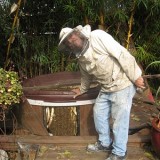
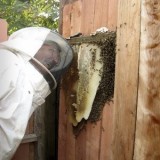
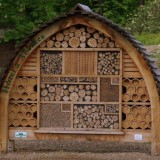
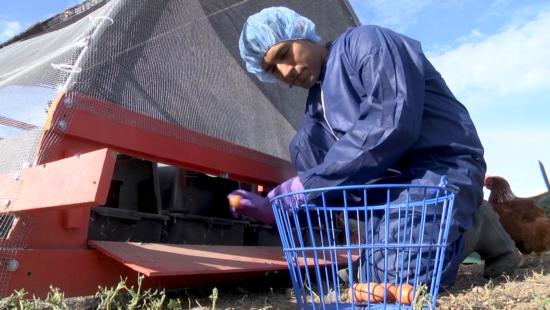
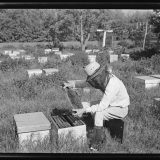
“The other lecturer, when asked why biodynamicists follow certain unusual practices such as burying dandelion flowers stuffed into the mesentery of a cow responded, “because Rudolf Steiner said so.””
I cringe when I read things like that….it’s a cop-out answer that only harms people’s perceptions of Steiner and biodynamic farming. As with many things Steiner it seems (hehe), there’s a simple answer and a not so simple answer. The simple one is that the dandelion preparation helps regulate potassium and silica. The not so simple one…well…it depends on how deep you want to go down the rabbit hole 🙂 (and I would invite readers to pick up a used copy of Steiner’s agricultural lectures if so interested….but fair warning, it’s not an easy read)
Thanks for the bee post. Time to watch some of his youtube videos.
Agreed. I wish more people in the biodynamic movement would just admit that Steiner was working in the Western esoteric tradition and work with that.
Funny thing about Thiele is that he comes across much better in person than in the videos on his website. Not sure why that is, exactly.
Beautiful article. Biodynamics is a method that views the garden or farm as a closed system that is also connected to the cosmos. I think of the preps as homeopathic treatments for the plants AND the earth. This is an oversimplification, but it also creates a connection between us and our plant world. When I go out into my garden in the morning I am also “asking” the plants to let me know what they need.
BTW, I’ve never been stung by a bee, only a wasp. They pick up on the chemicals we release when anxious and so I’ve always intuitively relaxed around them. They also fly into my studio when I’m blending with essential oils.
A couple of months ago when motorcycling, I felt something hit me in the face while my face shield was up…didn’t know what it was until I got to work several blocks later and found I had a bee in my helmet. No stings. Whenever a bee lands on me, I say hello and talk to it nicely. I’m 31 now, and have never been stung by a bee in my life! On the other hand, my friend thinks bees are out to get her, freaks out, and gets stung all the time.
Just like the people that are afraid of horses, dogs etc. No different with bees.
Happy riding to you.
I disagree with the ‘fear’ theory. I do not display fear of the dogs that have attacked me or acted agressively enough for the owners to remove them. I did not even know the dog was around, so I was not “emitting” fear.
I do believe that fast motions, flapping arms, could cause bees to become more aggressive.
The video and reading was great. I especially liked the building of the reed hive. It seems that type of construction might be applicable in other instances that I am still trying to imagine. The “needle” was ingenious.
How wonderful, I am so happy you attended the talk and shared it with us. As a parent of a child who attended a local Waldorf school for fifteen years and a “backwards” beekeeper I so appreciate this. Wish I had been there, thanks so much for posting this.
thank you for sharing this .
You may also discover a few more open gates by reading Rudolf Steiner s lectures on Bees.
Pseudoscience is pseudoscience, no matter what happy little label may be this month’s preferred terminoogy.